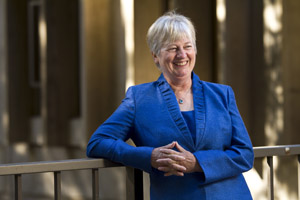Campus News
Meet Campus Provost/Executive Vice Chancellor Alison Galloway
Look around campus this fall, and you’ll likely see Alison Galloway. The new campus provost/executive vice chancellor plans to get out of Kerr Hall as much as possible during her first months on the job.

Alison Galloway, UCSC professor of anthropology and EVC-designate

Look around campus this fall, and you’ll likely see Alison Galloway.
The new campus provost/executive vice chancellor (CP/EVC) plans to get out of Kerr Hall as much as possible during her first months on the job to hear the concerns of faculty, staff, and students.
“What I want to bring is an openness to the EVC role,” said Galloway, who was selected by Chancellor George Blumenthal and approved by the UC Regents. “I’m not given to a lot of pomp. I really want to understand what’s going on.”
Galloway, a professor of anthropology, cherishes informality. Her office is decorated with Day of the Dead artwork, and she sips tea from a handmade mug embellished with a human skeleton. An animal lover, she volunteers with Native Animal Rescue, has two dogs (a mutt and a rescued American Brittany), two parakeets (that technically belong to her daughter, who moved away to college this fall), four owls undergoing rehabilitation, and two horses. She lives on six acres behind Dominican Hospital.
As CP/EVC, Galloway sees herself serving as a bridge between campus constituencies and as an advocate for UCSC at the systemwide level.
“A big part of my job will be to anticipate what’s coming and be sure we are prepared,” said Galloway. In an era of tight budgets, she plans to make fiscal decisions with an eye toward what will best serve faculty and students. Immediate top priorities include providing students with access to the classes they need and supporting faculty in that undertaking.
“Budget reductions have been very taxing on everybody,” she said. “It’s time to figure out if we’re doing the best we can.”
The opportunity to serve as CP/EVC comes at an optimal moment for Galloway, who is stepping down as vice provost of academic affairs and dean of UCSC Extension. She has also served previously as chair of the UCSC Academic Senate, campus diversity officer for faculty, and department chair of anthropology. “There’s more I can give,” she said.
Two other factors influenced her decision to apply for the number-two job on campus: The chance to work closely with Chancellor George Blumenthal, and her daughter’s departure for college this fall. Blumenthal and Galloway served as chair and vice-chair, respectively, of the UCSC Academic Senate.
“Our greatest strength at UC Santa Cruz is our power to transform,” she said. “We transform disciplines, we transform faculty. We nurture faculty to push the boundaries of what they can do, to push beyond the boundaries of their disciplines. And we do the same for students. We help them transform their lives.”
In her new role, Galloway is eager to help boost the campus’s reputation.
“The kinds of papers we put out are the ones that move disciplines,” she said with pride, referring to a recent analysis that ranked UCSC fourth in the nation, behind only Harvard, CalTech, and MIT, for the number of times UCSC’s scholarly publications were cited by other researchers. “That’s how researchers acknowledge the pathbreaking contributions of their peers. It’s a compelling measure of the greatness of a university.”
Within her own profession, Galloway has pushed to revisit categories that identify race and sex, because classifications such as “male” and “female,” as well as “white,” “black,” and “Hispanic,” don’t reflect the blurred lines of biological overlap nor the fluidity with which people identify themselves.
Like her CP/EVC predecessor Dave Kliger, Galloway intends to continue conducting research. Good thing, too, because law enforcement officials in the tri-county area rely on her when they need help identifying human remains. Many of the bodies she examines are homicide victims, and Galloway often appears in court as an expert witness to present her findings.
“Our role is to provide testimony based on what we found from the body,” she explained. “We are the victim’s only chance to provide information, which can result in a successful prosecution, or get somebody off who isn’t guilty.”
The quest for justice is a recurring theme in Galloway’s life. Her commitment to diversity stems in part from personal experience as one of few women in forensic science, particularly early in her career.
“We’d go to professional meetings, and it was like we were invisible,” she recalled. Today, there are very few people of color in her field. “We need to diversify, because the kinds of questions that need to be asked aren’t getting asked,” she said. “They won’t get asked if we keep picking people from the same backgrounds.”
Galloway, who was born in England but has lived in the United States since she was six, speaks with a slight English accent. She realizes English accents are perceived in this country as a “mark of privilege,” but her own accent is rooted in her parents’ working-class background in northeastern England, where residents labor in shipyards and coal mines.
“In England, you’re marked by your accent, and my parents had to fight to modulate their speech,” she said. “They didn’t want to pass on their dialect.”
Not willing to be bound by the past or confined by tradition, Galloway is determined to help UCSC define the terms by which it is known.
“We rely a lot on external agencies to validate our reputation–U.S. News & World Report‘s rankings, and others–whether or not the things they measure are central to our mission,” she said. “We need to go out and make the case for ourselves. We need to tell our own story.”